Mission
The Coastal Ecosystem Dynamics (CESD) specialization brings together faculty with expertise in coastal hydrodynamics, geo-mechanics, and ecology. The goal of the group is to advance fundamental science, provide solutions for resilient coastal communities, and train the next generation of scientists and engineers to succeed in academic and non-academic careers.
With nearly 40% of the world’s population lives within 100 kilometers of the coast, understanding the dynamics of coastal ecosystems is critical to ensure the resilience of human and natural coastal communities and requires multi-disciplinary research and solutions. Coastal ecosystems sit at the interface between marine and terrestrial environments, and their structure and stability are driven by complex interactions among hydrodynamic forces, geotechnical properties of natural and man-made substrates, and organisms that biogenically build coastal reefs and wetlands.
Students trained in the new PhD specialization will be prepared to pursue academic and industry careers in the fields of coastal, environmental, and geotechnical engineering, as well as, in the future, other engineering disciplines such as mechanics, structures, ecology, environmental science, geology, natural resource management and coastal resilience.
Faculty
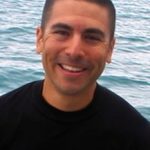 Andrew Altieri, Ph.D., Assistant Professor
Andrew Altieri, Ph.D., Assistant Professor
(352) 294-7748 | andrew.altieri@essie.ufl.edu
Research in Dr. Andrew Altieri’s lab examines the response of coastal ecosystems to global change. His research group is interested in how anthropogenic factors (e.g., species extinction, invasions, habitat degradation, climate change, overfishing) interact with biodiversity, species interactions, and emergent ecosystem functions. Much of his work has focused on the dynamics of ecologically important habitats created by living organisms including corals, mangroves, seagrass, and shellfish.[clear][/clear]
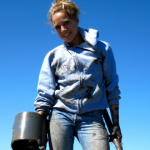 Christine Angelini, Ph.D., Assistant Professor
Christine Angelini, Ph.D., Assistant Professor
Graduate Curriculum Developer
(352) 294-7815 | christine.angelini@essie.ufl.edu
Research in Dr. Christine Angelini’s lab focuses on questions related to ecological community organization, ecological engineering, and ecosystem resilience to climate change, invasive species, and pollutants. Her lab utilizes field experiments, lab studies, correlational approaches, and model to provide mechanistic insight to ecosystem structure, function, and resilience to inform the conservation and management of natural systems.[clear][/clear]
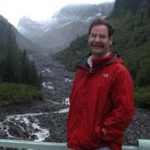 Michael Annable, Ph.D., P.E., Professor
Michael Annable, Ph.D., P.E., Professor
(352) 392-3294 | annable@ufl.edu
Dr. Annable has been a faculty member in the Department of Environmental Engineering Sciences at the University of Florida since 1992. He received his Ph.D. from Michigan State University working on soil vapor extraction of multi-component non-aqueous phase liquids. His research interests are in physical-chemical processes related to field scale applications of innovative technologies for subsurface characterization and remediation. His research also focuses on innovative methods for measuring water and solute flux and in aquifers and sediments. The patented passive flux meter (PFM) approach developed at the University of Florida has been used at more than 70 field sites. [clear][/clear]
 Alberto Canestrelli, Ph.D., Assistant Professor
Alberto Canestrelli, Ph.D., Assistant Professor
(352) 294-7583 | alberto.canestrelli@essie.ufl.edu
Dr. Canestrelli studies the long term evolution of beaches, the mechanisms of beach recovery, and the impact of crab grazing on the hydrodynamics of tidal creeks.[clear][/clear]
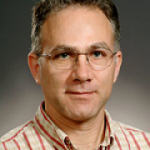 Paul D. Gader, Ph.D., Professor
Paul D. Gader, Ph.D., Professor
(352) 294-1629 | paul.gader@essie.ufl.edu
Dr. Gader has been researching hyperspectral algorithms, or algorithms for imaging spectroscopy, since 2002, initially working on land-mine detection using LWIR hyperspectral; planning and conducting multiple VIS/NIR/SWIR and LiDAR airborne data collections. His research has focused on unmixing, dimensionality reduction, material detection, and classification, using both physics-based and data driven nonlinear models.[clear][/clear]
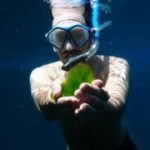 David Kaplan, Ph.D., Assistant Professor
David Kaplan, Ph.D., Assistant Professor
(352) 392-8439 | dkaplan@ufl.edu
Research in Dr. Kaplan’s Watershed Ecology Lab focuses on linkages among the hydrological cycle, ecosystem processes, and human activities, with the goal of advancing natural resources conservation and management. Current work focuses on three primary topics: 1) Hydrological, ecological and human drivers of coastal change; 2) Wetland, Riverine, and Forest Ecohydrology; and 3) Social-ecological effects of hydroelectric dams in the Amazon. Several projects in the lab are examining the interactive effects of SLR, climate change, groundwater supply, and land use on coastal ecosystems. [clear][/clear]
Michael C. McVay, Ph.D., Professor
(352) 273-1835 | mcm@ce.ufl.edu
[clear][/clear]
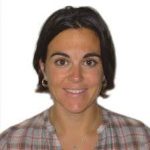 Maitane Olabarrieta, Ph.D., Assistant Professor
Maitane Olabarrieta, Ph.D., Assistant Professor
(352) 294-7812 | maitane.olabarrieta@essie.ufl.edu
Research in Dr. Olabarrieta’s Coastal Morphodynamics Lab focuses on the processes that drive coastal erosion and flooding under extreme storms and longer-term (seasonal to decadal) inlet and estuarine morphodynamics. One of the main goal is to improve numerical models used to predict coastal change, erosion and flooding. Within the Coastal Morphodynamics Lab, undergraduate and graduate students combine advanced numerical modeling, field surveys and remote sensing to analyze the feedbacks between the hydrodynamics, sediments transport and coastal morphology.[clear][/clear]
 Alex Sheremet, Ph.D., Professor
Alex Sheremet, Ph.D., Professor
(352) 294-7811 | alex.sheremet@essie.ufl.edu
General: Waves in nonlinear dynamical systems, data analysis methods; nonlinear time series analysis.
Ocean Waves: Shoaling of broad-spectrum ocean waves; nonlinear evolution of infragravity waves.
Wave-sediment interaction: wave dissipation, flocculation, bed liquefaction.
The Nonlinear Brain: memory formation; patterns; dissipative solitons. [clear][/clear]
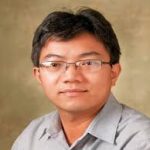 Khiem Tran, Ph.D., Associate Professor
Khiem Tran, Ph.D., Associate Professor
(352) 273-4609 | khiem.tran@essie.ufl.edu
Dr. Khiem Tran’s research areas include Geophysical Testing and Evaluation, as well as Foundation Design and Capacity Assessment. He mostly focuses on geophysical testing for material imaging and characterization at various length scales from millimeters to hundreds of meters, as well as foundation dynamics and monitoring for integrity and capacity assessment. [clear][/clear]
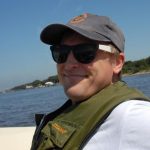 Scott Wasman, Ph.D., Research Assistant Professor
Scott Wasman, Ph.D., Research Assistant Professor
(352) 273-4609 | scott.wasman@essie.ufl.edu
Dr. Scott Wasman studies soil mechanics, soil structure interaction, geotechnical reliability, bioinspired geotechnics, coastal and ecosystem geotechnics. He uses field work, laboratory tests, mathematics, and statistics, to inform models, develop design equations, and enhance measurement techniques in order to improve geotechnical systems and understand geotechnics beneficial role for society and ecosystems. [clear][/clear]
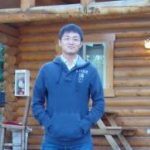 Xiao Yu, Ph.D., Assistant Professor
Xiao Yu, Ph.D., Assistant Professor
(352) 294-7754 | xiao.yu@essie.ufl.edu
Dr. Yu’s research interest is nearshore processes with focus on turbulent mixing and transport, and sediment transport using multi-scale numerical simulations and theoretical analyses. His group studies processes at the scales of centimeters to meters in estuaries and coastal regions. These small-scale processes are important in the transport and fate of sediment, nutrient, pollutants and larvae. Understanding these small-scale processes is critical to the morphodynamics of beaches and estuaries, the health of coastal ecosystems, vulnerability of coastal infrastructures and the impact of human activities on coastal systems.[clear][/clear]
Ph.D. Students
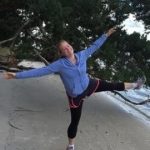
Emily Astrom
Adviser: Dr. Sheremet
Emily graduated in 2016 from UF with a BS in Mathematics, minor in Statistics. Her research focuses on understanding the dynamics of edge-wave solitons, including their generation, evolution, and nonlinear disintegration cascade, under the combined effects of background swells, nearshore currents, and the sedimentary environment. Her approach combines theoretical modeling (mainly in the framework of the KdV equation) with field experiments and data analysis. [clear][/clear]
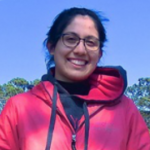 Ada Bersoza
Ada Bersoza
Email: acbersoza@ufl.edu | Adviser: Dr. Angelini
Ada’s research focuses on developing new, ecologically engineered approaches to restoring oyster reefs in degraded estuaries. In particular, she is integrating classic ecological theory on community assembly and predator-prey interactions in the design of cost-effective and durable structures to enhance oyster reef establishment and persistence along the Gulf and Atlantic Coasts of Florida.[clear][/clear]
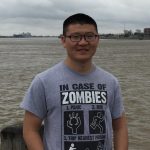 Zhendong Cao
Zhendong Cao
Adviser: Dr. Olabarrieta
Zhendong got his Bachelor and Master degrees in Marine Environmental Science in Ocean University of China, Qingdao, China. His research mainly focused on the numerical modeling of coastal circulation and nearshore mass transport. Zhendong had one and a half year study experience in University of Maryland Eastern Shore, working on optimizing an unstructured-grid water quality model. Zhendong transferred to University of Florida in 2014 and started his PhD study in Coastal Engineering Program. His present research is the numerical study of baroclinic effects on long-term morphodynamic evolution in estuaries. Zhendong plans to graduate in May 2018. [clear][/clear]
 Chris Discenza
Chris Discenza
Adviser: Dr. Sheremet
Chris (pictured here with his friend Cauchy) has a B.S. in Mathematics from the University of Arizona with a minor in physics, and a M.S in Mathematics from the University of Florida specializing in topology. In his Ph.D. research, Chris studies wave propagation around islands, with a focus on trapped infragravity waves. His theoretical formulation generalizes Zakharov’s dynamic equation to trapped waves and investigates trapped-wave generation, evolution, dissipation, and interaction with deep-ocean swells. His results shed an interesting light on the kinetics of trapped waves in general. [clear][/clear]
 Huidi Liang (Visiting Phd student from Tongji University, China)
Huidi Liang (Visiting Phd student from Tongji University, China)
UF Adviser: Dr. Olabarrieta
Huidi Liang is a visiting scholar whose research is focused on coastal morphodynamics and long term morphodynamic evolution numerical models. Specifically, she is very interested on the responses of hydrodynamics to sea level rise and on the effects of human activities and climate change on coastal evolution. [clear][/clear]
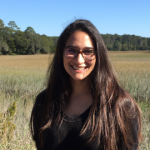 Kimberely Prince
Kimberely Prince
Adviser: Dr. Angelini
Kim’s research seeks to elucidate the fate and transport of contaminants through coastal food webs. Using experimental, correlational and modeling approaches, she seeks to understand how patterns in salt marsh community structure mediate spatial variation in PCB biomagnification in southeastern US estuaries. Through her quantification of PCB levels in key recreational fisheries species as they mature from juvenile to adult life stages, Kim’s dissertation research also has important implications for human health in the region. [clear][/clear]
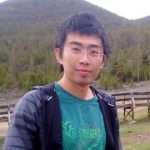 Yu Qin
Yu Qin
Adviser: Dr. Sheremet
Yu studies dissipative brain dynamics with the goal of understanding the mechanisms of memory formation. His work combines theoretical and numerical modeling, as well as data analysis, using orthogonal Fourier and wavelet decompositions and embeddings. His other research interests include
Dynamics: Lagrangian and Hamiltonian mechanics.
Turbulence: Time-averaged NS-equation and space-averaged NS-equation. Multiphase flow modeling using VOF method with interface capturing.
Algorithms: Bionic Intelligence (Genetic Algorithm, Neural Network, Ant Colony, etc.) based decision making and optimization. [clear][/clear]
 Christian Rojas-Vazquez
Christian Rojas-Vazquez
Adviser: Dr. Olabarrieta
As a Puerto Rican native, Christian finished his bachelor and master’s degree in Civil Engineering at the University of Puerto Rico at Mayaguez. His Master thesis focused on the evaluation of nearshore sand shoals as potential beach nourishment borrow sites for eroding beaches at Rincon, Puerto Rico. During his research, Christian gained vast field work experience in the area of hydrography and data collection. He also improved his analytical and problem solving skills through 2D nearshore numerical models developed by the U.S Army Corps of Engineers. His passion to understand coastal processes led him to pursue a PhD degree at the Coastal Engineering department of the University of Florida. Since being admitted in fall 2015, Christian has been analyzing the sediment bypassing mechanism in mixed-energy tidal inlets using multispectral images and numerical modeling at Matanzas Inlet (FL). [clear][/clear]
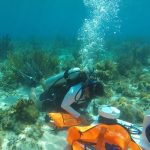 Legna Torres-Garcia
Legna Torres-Garcia
Adviser: Dr. Olabarrieta
Legna received her Bachelor’s degree in Physics from the University of Puerto Rico at Mayagüez in 2006. She earned her first Master’s of Science degree in 2009 studying astrophysics at the University of South Carolina. She earned a second M.S. degree in 2014 studying physical oceanography at the University of South Carolina. Her research focused on the flow dynamics in the transition zone from estuarine tidal to fluvial regimes. After finishing her second master degree she accepted a position as a Scientist-II with Cherokee Nation Technology contracted to U.S. Geological Survey with the Coral Reef Ecosystem Studies project. Her research focused on the hydrodynamics of coral-reef systems using wave and ocean circulation models coupled with empirical data collected from in situ oceanographic instruments. Currently, she is a doctoral candidate at the University of Florida. She aims to combined observational and the numerical model data over large scale regions to understand circulation, waves, sediment transport and potential impacts of the reef on coastal vulnerability. [clear][/clear]
 Amanda Tritinger (Joint UF/UNF student)
Amanda Tritinger (Joint UF/UNF student)
UF Adviser: Dr. Olabarrieta
Amanda studied Environmental Engineering at the University of Central Florida in Orlando. There she took place in undergraduate research in the potential energy of the Florida current. She then moved to Jacksonville, FL to study Civil Engineering with a focus in Coastal Modeling. She effectively defended her thesis on the numerical modeling and analysis of tidal variance and marsh productivity in the Guana Tolomato Matanzas National Estuarine Research Reserve (GTMNERR), and in May 2015 received her Master’s degree from the University of North Florida. Presently, she is a doctoral candidate at the University of Florida in Gainesville. There, she studies Coastal Engineering and is focusing on data analysis techniques. Her research specifically focused on understanding near shore processes and modeling them effectively in a two dimensional simulation. She plans to defend her dissertation in May 2018. [clear][/clear]
Master Students
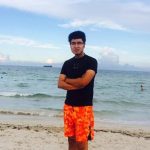 Luming Shi (Master student)
Luming Shi (Master student)
UF Adviser: Dr. Olabarrieta
Luming is a second year master student at the University of Florida. His research is focused on the flooding and breaking conditions during Tropical storm Fay 2008. Luming uses the COAWST modeling system to analyze the relative influence of tides, wave setup, storms surge and infragravity waves close to Matanzas Inlet (FL), where a breach was originated during the storm. [clear][/clear]
Undergrad Students
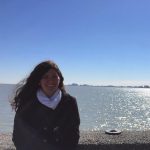 Tristen Townsend (Undergraduate student)
Tristen Townsend (Undergraduate student)
Adviser: Dr. Maitane Olabarrieta
Tristen is a 4th year majoring in Mathematics and Environmental Science and minoring in Sustainability Studies. My research interests are tidal dynamics in estuaries, sediment transport and inlet morphodynamics. [clear][/clear]
FORMER Students
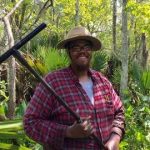 Elliott White
Elliott White
Adviser: Dr. Kaplan
PhD student Elliott White works to understand how chronic low-level salinity affects the health and productivity of coastal bald cypress (Taxodium distichum) swamps. Elliott is collecting ecological and hydrological data at sites across the Gulf of Mexico from Texas to Florida to show how connections between groundwater salinity, forest productivity, and mortality vary by region. [clear][/clear]
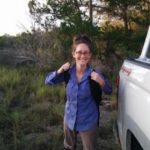 Amy Langston
Amy Langston
Adviser: Dr. Kaplan
PhD student Amy Langston is investigating how SLR and a warming climate are driving reassembly trajectories of coastal vegetation. Her data on tree and understory vegetation in freshwater forest islands extend a 20-year dataset and reveal long-term trends of forest decline and marsh conversion. Amy’s field experiments on mangrove seedling success in relict freshwater islands show that, while climate change provides favorable conditions for mangrove establishment, crab predation and insect herbivory are strong top-down controls on mangrove encroachment into new areas. [clear][/clear]
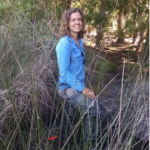 Katie Glodzik
Katie Glodzik
Adviser: Dr. Kaplan
PhD student Katie Glodzik is studying how saltwater intrusion from SLR and decreased river flow are combining to threaten coastal ecosystems, particularly those modified by development. Her study looks at drivers and impacts of saltwater intrusion and altered hydrology in the coastal wetlands of Florida’s Big Bend region to meet three primary objectives: 1) to determine long-term trends and drivers of river discharge; 2) to evaluate the effect of coastal roads on salt marsh hydrology and ecology; and 3) to use physical and hydrological variables to predict coastal forest die-off. Preliminary results show that roads consistently decrease invertebrate densities in tidally-restricted marshes, while impacts to salinity and vegetation vary by road.[clear][/clear]
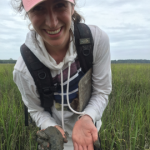 Sinead Crotty
Sinead Crotty
Adviser: Dr. Angelini
Sinead is an experimental community ecologist whose dissertation research aims to identify how estuarine hydrodynamics mediates the assembly and resilience of salt marsh communities. Sinead utilizes a compilation of spatial analyses, field experiments, surveys and lab studies to unravel the role of tidal creek complexity and ribbed mussels in mediating patterns in biodiversity across multiple spatial scales in southeastern Atlantic salt marshes. [clear][/clear]
